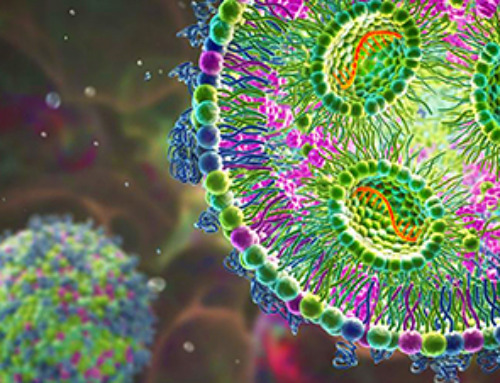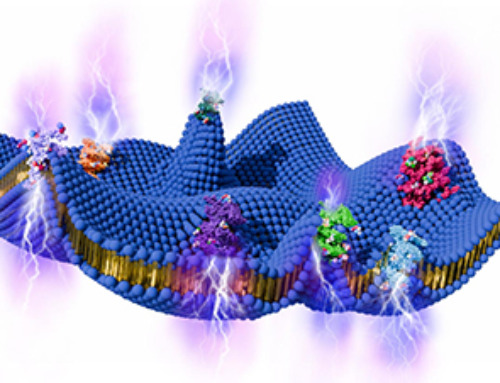Imagine a stadium packed with 75,000 fans, all wearing green and white jerseys—except one person in a solid green shirt. Finding that person would be tough. That’s how hard it is for scientists to find disease markers—called biomarkers—in the blood. And instead of one stadium, researchers must search through the equivalent of 100,000 stadiums worth of information.
To tackle this challenge, a research team from Michigan State University, working with scientists from Augusta University, Karolinska Institute and Stanford University, used nanomedicine, artificial intelligence, or AI, and a method for studying cause and effect.
Their goal was to find rare biomarkers for prostate cancer that has spread, and a condition called atherosclerosis, which causes clogged arteries. Their research findings were recently published in the Chemical Engineering Journal.
“Cells affected by disease secrete proteins and other biomolecules into the bloodstream,” said Morteza Mahmoudi, associate professor in the Department of Radiology and the Precision Health Program in the MSU College of Human Medicine. “These proteins provide valuable clues about a patient’s health status or disease, and they can be collected and studied. Once identified, they pave the way for a significant advancement in the development of personalized medical treatments, or precision medicine.”

How they made the discovery
“Human blood plasma contains many different proteins, and the rarest proteins are the ones that contain valuable insights into diseases,” Mahmoudi explained. “To magnify information from the less abundant plasma proteins, we introduced small particles—nanoparticles that can’t be seen with the human eye—to plasma samples. Then we harnessed AI and actual causality to analyze the results. This is how we identify potential biomarkers for metastatic prostate cancer and atherosclerosis.
“It’s the first time that nanomedicine, protein corona, AI and actual causality have been used together to identify a cause for disease,” he added. “We’re excited because this discovery has the potential to advance early detection and develop targeted therapies for prostate cancer and atherosclerosis.”
MSU researchers Mohammad Ghassemi, Borzoo Bonakdarpour and Liangliang Sun made significant contributions to this research, Mahmoudi said.
More information: Avirup Guha et al, AI-driven prediction of cardio-oncology biomarkers through protein corona analysis, Chemical Engineering Journal (2025). DOI: 10.1016/j.cej.2025.161134
Journal information: Chemical Engineering Journal
News
Nanomedicine in 2026: Experts Predict the Year Ahead
Progress in nanomedicine is almost as fast as the science is small. Over the last year, we've seen an abundance of headlines covering medical R&D at the nanoscale: polymer-coated nanoparticles targeting ovarian cancer, Albumin recruiting nanoparticles for [...]
Lipid nanoparticles could unlock access for millions of autoimmune patients
Capstan Therapeutics scientists demonstrate that lipid nanoparticles can engineer CAR T cells within the body without laboratory cell manufacturing and ex vivo expansion. The method using targeted lipid nanoparticles (tLNPs) is designed to deliver [...]
The Brain’s Strange Way of Computing Could Explain Consciousness
Consciousness may emerge not from code, but from the way living brains physically compute. Discussions about consciousness often stall between two deeply rooted viewpoints. One is computational functionalism, which holds that cognition can be [...]
First breathing ‘lung-on-chip’ developed using genetically identical cells
Researchers at the Francis Crick Institute and AlveoliX have developed the first human lung-on-chip model using stem cells taken from only one person. These chips simulate breathing motions and lung disease in an individual, [...]
Cell Membranes May Act Like Tiny Power Generators
Living cells may generate electricity through the natural motion of their membranes. These fast electrical signals could play a role in how cells communicate and sense their surroundings. Scientists have proposed a new theoretical [...]
This Viral RNA Structure Could Lead to a Universal Antiviral Drug
Researchers identify a shared RNA-protein interaction that could lead to broad-spectrum antiviral treatments for enteroviruses. A new study from the University of Maryland, Baltimore County (UMBC), published in Nature Communications, explains how enteroviruses begin reproducing [...]
New study suggests a way to rejuvenate the immune system
Stimulating the liver to produce some of the signals of the thymus can reverse age-related declines in T-cell populations and enhance response to vaccination. As people age, their immune system function declines. T cell [...]
Nerve Damage Can Disrupt Immunity Across the Entire Body
A single nerve injury can quietly reshape the immune system across the entire body. Preclinical research from McGill University suggests that nerve injuries may lead to long-lasting changes in the immune system, and these [...]
Fake Science Is Growing Faster Than Legitimate Research, New Study Warns
New research reveals organized networks linking paper mills, intermediaries, and compromised academic journals Organized scientific fraud is becoming increasingly common, ranging from fabricated research to the buying and selling of authorship and citations, according [...]
Scientists Unlock a New Way to Hear the Brain’s Hidden Language
Scientists can finally hear the brain’s quietest messages—unlocking the hidden code behind how neurons think, decide, and remember. Scientists have created a new protein that can capture the incoming chemical signals received by brain [...]
Does being infected or vaccinated first influence COVID-19 immunity?
A new study analyzing the immune response to COVID-19 in a Catalan cohort of health workers sheds light on an important question: does it matter whether a person was first infected or first vaccinated? [...]
We May Never Know if AI Is Conscious, Says Cambridge Philosopher
As claims about conscious AI grow louder, a Cambridge philosopher argues that we lack the evidence to know whether machines can truly be conscious, let alone morally significant. A philosopher at the University of [...]
AI Helped Scientists Stop a Virus With One Tiny Change
Using AI, researchers identified one tiny molecular interaction that viruses need to infect cells. Disrupting it stopped the virus before infection could begin. Washington State University scientists have uncovered a method to interfere with a key [...]
Deadly Hospital Fungus May Finally Have a Weakness
A deadly, drug-resistant hospital fungus may finally have a weakness—and scientists think they’ve found it. Researchers have identified a genetic process that could open the door to new treatments for a dangerous fungal infection [...]
Fever-Proof Bird Flu Variant Could Fuel the Next Pandemic
Bird flu viruses present a significant risk to humans because they can continue replicating at temperatures higher than a typical fever. Fever is one of the body’s main tools for slowing or stopping viral [...]
What could the future of nanoscience look like?
Society has a lot to thank for nanoscience. From improved health monitoring to reducing the size of electronics, scientists’ ability to delve deeper and better understand chemistry at the nanoscale has opened up numerous [...]





















